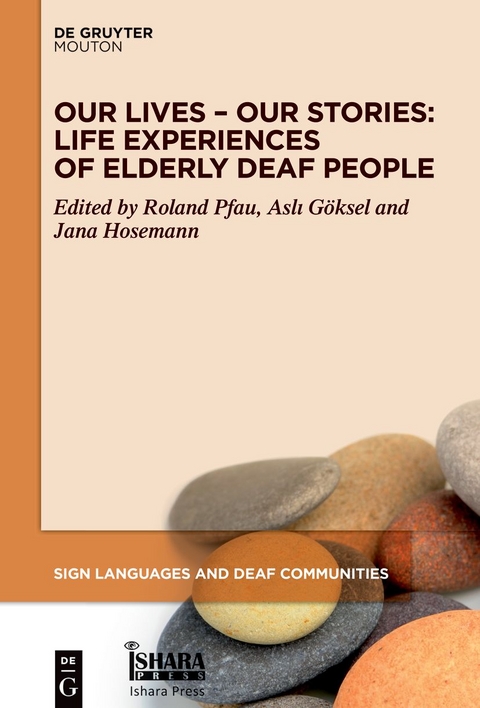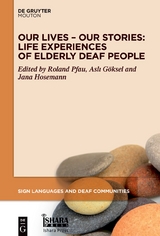Our Lives – Our Stories
Life Experiences of Elderly Deaf People
Seiten
2021
de Gruyter Mouton (Verlag)
978-3-11-070180-7 (ISBN)
de Gruyter Mouton (Verlag)
978-3-11-070180-7 (ISBN)
Over the past decades, the field of sign language linguistics has expanded considerably. Recent research on sign languages includes a wide range of subdomains such as reference grammars, theoretical linguistics, psycho- and neurolinguistics, sociolinguistics, and applied studies on sign languages and Deaf communities. The SLDC series is concerned with the study of sign languages in a comprehensive way, covering various theoretical, experimental, and applied dimensions of sign language research and their relationship to Deaf communities around the world. The series provides a multidisciplinary platform for innovative and outstanding research in sign language linguistics and aims at linking the study of sign languages to current trends in modern linguistics, such as new experimental and theoretical investigations, the importance of language endangerment, the impact of technological developments on data collection and Deaf education, and the broadening geographical scope of typological sign language studies, especially in terms of research on non-Western sign languages and Deaf communities.
Sign languages are non-written languages. Given that the use of digital media and video recordings in documenting sign languages started only some 30 years ago, the life stories of Deaf elderly signers born in the 1930s-1940s have – except for a few scattered fragments in film – not been documented and are therefore under serious threat of being lost.The chapters compiled in this volume document important aspects of past and present experiences of elderly Deaf signers across Europe, as well as in Israel and the United States. Issues addressed include (i) historical events and how they were experienced by Deaf people, (ii) issues of identity and independence, (iii) aspects of language change, (iv) experiences of suppression and discrimination. The stories shared by elderly signers reveal intriguing, yet hidden, aspects of Deaf life. On the negative side, these include experiences of the Deaf in Nazi Germany and occupied countries and harsh practices in educational settings, to name a few. On the positive side, there are stories of resilience and vivid memories of school years and social and professional life.In this way, the volume contributes in a significant way to the preservation of the cultural and linguistic heritage of Deaf communities and sheds light on lesser known aspects against an otherwise familiar background. This publication has been made possible within the SIGN-HUB project, which has received funding from the European Union’s Horizon 2020 research and innovation programme.
Sign languages are non-written languages. Given that the use of digital media and video recordings in documenting sign languages started only some 30 years ago, the life stories of Deaf elderly signers born in the 1930s-1940s have – except for a few scattered fragments in film – not been documented and are therefore under serious threat of being lost.The chapters compiled in this volume document important aspects of past and present experiences of elderly Deaf signers across Europe, as well as in Israel and the United States. Issues addressed include (i) historical events and how they were experienced by Deaf people, (ii) issues of identity and independence, (iii) aspects of language change, (iv) experiences of suppression and discrimination. The stories shared by elderly signers reveal intriguing, yet hidden, aspects of Deaf life. On the negative side, these include experiences of the Deaf in Nazi Germany and occupied countries and harsh practices in educational settings, to name a few. On the positive side, there are stories of resilience and vivid memories of school years and social and professional life.In this way, the volume contributes in a significant way to the preservation of the cultural and linguistic heritage of Deaf communities and sheds light on lesser known aspects against an otherwise familiar background. This publication has been made possible within the SIGN-HUB project, which has received funding from the European Union’s Horizon 2020 research and innovation programme.
Roland Pfau , Universiät Amsterdam, Niederlande; Asli Göksel , Bogaziçi Universität, Istanbul, Türkei; Jana Hosemann , Universität zu Köln.
"A valuable resource for both in-field and out-of-field researchers. Researchers working on and with Deaf communities can benefit from the well-discussed findings on identity, intersectionality, history, or caregiving. New researchers to the Deaf communities can also benefit from the diverse representations of Deaf lives."
Serpil Karabuklu, Purdue University for LINGUIST List 33.2553
| Erscheinungsdatum | 21.01.2021 |
|---|---|
| Reihe/Serie | Sign Languages and Deaf Communities [SLDC] ; 14 |
| Zusatzinfo | 76 b/w ill., 8 b/w tbl. |
| Verlagsort | Basel/Berlin/Boston |
| Sprache | englisch |
| Maße | 155 x 230 mm |
| Gewicht | 751 g |
| Themenwelt | Geisteswissenschaften ► Sprach- / Literaturwissenschaft ► Sprachwissenschaft |
| Schlagworte | Deaf Community • Deaf Culture • elderly people • Gehörlos • Sign Language • Zeichensprache |
| ISBN-10 | 3-11-070180-4 / 3110701804 |
| ISBN-13 | 978-3-11-070180-7 / 9783110701807 |
| Zustand | Neuware |
| Informationen gemäß Produktsicherheitsverordnung (GPSR) | |
| Haben Sie eine Frage zum Produkt? |
Mehr entdecken
aus dem Bereich
aus dem Bereich
Das umfassende Standardwerk auf der Grundlage der aktuellen amtlichen …
Buch | Hardcover (2024)
Duden (Cornelsen Verlag)
35,00 €




